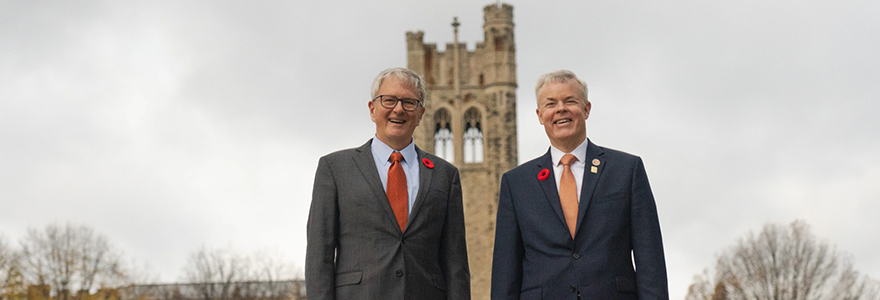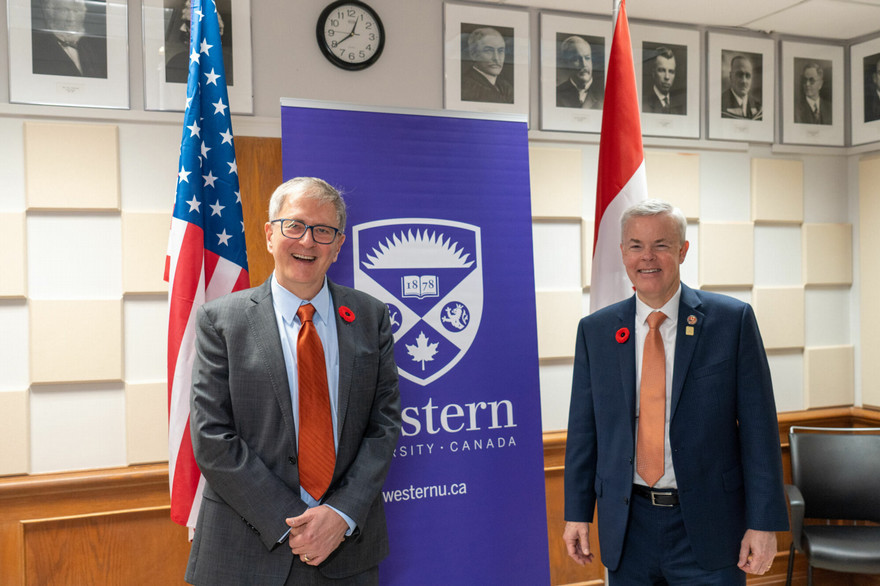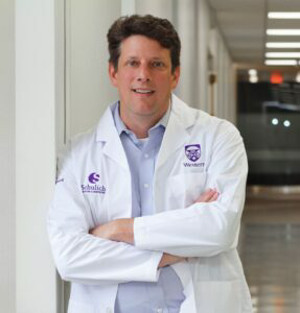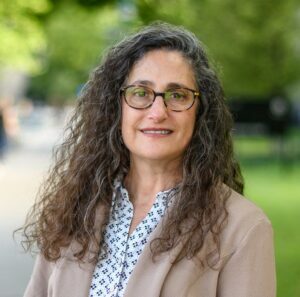‘Bilateral cooperation:’ U.S. Consul General Baxter Hunt visits Western

By Western Communications and Schulich Medicine & Dentistry Communications
The U.S. Consul General in Toronto, Baxter Hunt, visited Western on Oct. 31, highlighting the university’s strong connections with students, scholars and medical research agencies south of the border.
Hunt spoke with Western leaders and researchers and toured the Imaging Pathogens for Knowledge Translation (ImPaKT) facility, which was built to enhance understanding of infectious diseases, using cellular and animal imaging technologies to enable real-time visualization of infections.
“I had a great visit to Western,” said Hunt. “I was very impressed with the work the university is doing on entrepreneurship, climate research and health. The ImPaKT facility is clearly on the cutting edge of research on infectious disease, especially with the new pathogen research centre under development.”
Hunt recognized the impact driven by powerful collaborations between Canadian and U.S. universities and funders.
“It was great to hear about all of the research partnerships Western has with U.S. universities, as well as the funding from the U.S. National Institutes of Health (NIH) and the National Science Foundation that is supporting work at Western. Great Canadian and American minds working together are tackling some of the most challenging global problems we face, and we’re glad to have this bilateral cooperation,” Hunt said.

Western has flourishing partnerships with U.S. universities and institutions to deliver unique student learning experiences and compelling research. There are a number of exchange programs and hundreds of additional international learning experiences for Western students in the U.S.
More than 7,000 publications were co-authored by Western researchers with their U.S. counterparts over the past five years. Harvard University, the University of California San Diego and the Mayo Clinic collaborated with Western most frequently.
Western researchers hold millions in NIH funding, with an emphasis on neuroscience and studies on aging. The university has a total of 88 NIH grant-holders.
“Canada and the U.S. enjoy a unique history of close collaboration and partnership. That geopolitical relationship is also reflected among university partnerships and research collaborations,” said Western President Alan Shepard.
“We are proud of Western’s many connections to the U.S., and we look forward to building on our strong partnerships to advance critical research in the best interest of both countries.”
‘Powerhouse research’ earns $7.5M in NIH funding
Schulich School of Medicine & Dentistry’s leadership in infectious disease research continues to fuel interest, collaboration and funding support from U.S. institutions.
 Dr. John Yoo
Dr. John Yoo
In the past five years, Schulich Medicine & Dentistry researchers have garnered more than $7.5 million in NIH funding to support groundbreaking biomedical research projects. This includes nearly $3 million for Schulich Medicine & Dentistry-led research, and more than a dozen collaborative ventures with research partners, the majority based in the U.S.
NIH-funded work at the School ranges from exploring cognitive resilience in “Super Agers” to monitoring cell-based cancer therapies through advanced imaging techniques, with about one-third of recent NIH-funded projects dedicated to combatting pathogens and infectious diseases, including HIV and respiratory viruses.
Dr. John Yoo, dean of Schulich Medicine & Dentistry, said this focus reflects the strength of its research expertise, facilities, tools and technology.
“As home to one of Canada’s leading high-containment-level facilities, and with powerhouse research strength in infectious diseases, neuroscience and neuroimaging, our scientists are making breakthroughs and discovering solutions to help governments and industry around the world prepare and respond to major health threats,” Yoo said.
Infectious disease research with impact
Schulich Medicine researchers Eric Arts, Canada Research Chair in HIV Pathogenesis and Viral Control, and Dr. Robyn Klein, Canada Excellence Research Chair in Neurovirology and Neuroimmunology, hold the two largest NIH grants at Western.
 Eric Arts
Eric Arts
Arts, who met with Hunt during his visit to Western, is a globally prominent HIV researcher leading a nearly $2.4-million NIH grant focused on better understanding factors that impact initial viral transmission.
The end goal, he says, is to improve HIV-1 vaccine design to make it more effective.
“To live HIV-free is a goal for the 39 million infected. It is also the priority of the United Nations and World Health Organization to end the HIV pandemic by 2030,” Arts said.
Klein, a renowned American neuroimmunologist, was recently recruited to Western to build and lead Canada’s first-ever research program focused on understanding the impact of infectious diseases on cognition and the human brain.
 Dr. Robyn Klein
Dr. Robyn Klein
With the support of a $1.8-million NIH grant, Klein is homing in on encephalitis alphaviruses – highly contagious viruses that infect the central nervous system and can result in severe long-term impacts or death.
Since its opening in 2019, the state-of-the-art ImPaKT facility has played a vital role in deepening insights into infectious diseases, showing how viruses, like SARS-CoV-2, spread and impact human health.
Now, with significant backing from the federal and provincial governments, including through the Biosciences Research Infrastructure Fund, Schulich Medicine & Dentistry is expanding its containment level 3 capabilities by building a microbial transmission facility. There, scientists will be able to investigate how factors like temperature, air currents and humidity impact aerosol transmission in “real world” conditions, with unprecedented scale and validity.
“Not only will we be able to study virus transmission and antimicrobial strategies, we’re also including a manufacturing facility where we can develop, test and produce promising therapeutics and vaccines right here at home,” said Arts.
“This is going to be ground zero for industry leaders, government and public health officials looking for expertise and tools to inform their strategies around infectious diseases.”









